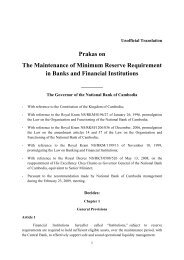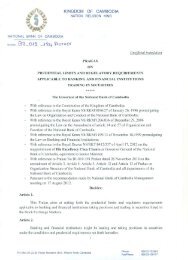National Bank of Cambodia
National Bank of Cambodia
National Bank of Cambodia
- No tags were found...
You also want an ePaper? Increase the reach of your titles
YUMPU automatically turns print PDFs into web optimized ePapers that Google loves.
% to GDP Public Debt and fiscal deficits to GDP% to GDP150100500142.810.532.496.2 939.1Public debt to GDPFiscal deficits to GDPGreece Ireland Portugal Spain Italy609.21194.635302520151050The second factor is the mismatch between government revenues andexpenditures. Greece’s public spending excluding interest payments accounted for 32percent <strong>of</strong> GDP, while public revenues excluding social security contributionsamounted to only 20 percent. This discrepancy is due partly to inefficient taxcollection, as well as tax invasion particularly among high-income bracket individuals,resulting in ongoing fiscal deficits. Greece also needed to make substantial interestpayments due to a large amount <strong>of</strong> borrowings from financial markets during the pastten years. Being a member <strong>of</strong> the European Union was also a factor that helpedGreece to borrow cheaply. Greece’s long-term interest rates and long-termgovernment bond yields significantly declined after it became a member <strong>of</strong> theEuropean Union.Third, Greece’s competitiveness is declining relative to its peers in theEuropean Union. A measure <strong>of</strong> Greece’s competitiveness has decreased by more than25 percent since becoming an EU member in 2000. The average wage and unit laborcost in Greece were higher than its counterparts in the euro area. These were the mainobstacle to economic growth that will also adversely affect on tax revenues.Finally, during the global financial crisis in 2008, the Greek government spentextensively to stimulate the economy, contributing to the large fiscal burden and loss<strong>of</strong> investor confidence in the government’s debt repayment ability. Since the end <strong>of</strong>2009 Greek sovereign bonds’ ratings were continuously downgraded to belowinvestment grade, driving up financing costs and reducing the likelihood <strong>of</strong> payingback their debts.Solutions to the sovereign debt crisisThe EU/IMF solution to the Greek problem has been mainly focused onliquidity risks in the medium term. Between now and 2014, after which it would needto raise funds from the financial markets again, Greece is expected to restructureeconomy under the bailout conditionality by implementing fiscal austerity measures,including decreasing public expenditures and raising revenues to curtail fiscal deficit.Nonetheless, the credibility <strong>of</strong> the program has been questioned, particularly at the end<strong>of</strong> last year when Greece failed to achieve EU/IMF conditionality as the economyunexpectedly contracted by 4.5 percent owing to weak domestic demand. Thefinancial package, initially expected to end in 2013, has thus been extended to end a៣៦ ២ ២០១១<strong>National</strong> <strong>Bank</strong> <strong>of</strong> <strong>Cambodia</strong> Review No 36, 2 nd Quarter 201142
















